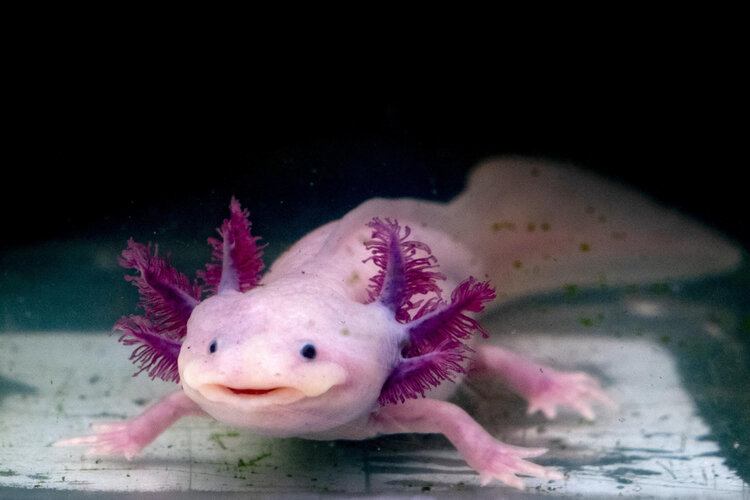If your axolotl is not eating, it could be due to stress or illness. Axolotls, also known as mexican walking fish, are unique aquatic creatures that have gained popularity as pets.
They have an unusual appearance, with external gills and the ability to regenerate limbs. However, if you notice that your axolotl is not eating, it can be a cause for concern. In most cases, the lack of appetite can be attributed to stress or illness.
Factors such as changes in water conditions, improper temperature, poor diet, or overcrowding can lead to stress in axolotls, causing them to lose interest in food. On the other hand, illness can also result in a loss of appetite. It is important to identify the underlying cause and take necessary steps to address the issue to ensure the well-being of your axolotl.

Credit: www.hepper.com
Stress-Related Issues
Axolotls not eating can be attributed to stress-related issues such as a change in their environment or tank conditions. When the tank becomes overcrowded, it can induce stress in axolotls, affecting their appetite. Additionally, insufficient hiding spots may cause them to feel exposed and anxious, leading to a loss of interest in food.
To address this, create a calm and comfortable environment for your axolotl by providing ample space and adding suitable hiding spots. This will help alleviate any stress they might be experiencing and encourage them to resume eating. Regularly monitor the tank conditions and ensure they are within the optimal range for your axolotl’s well-being.
By understanding and addressing the causes of stress, you can help your axolotl regain its appetite and maintain a healthy eating routine.
Health Problems
Your axolotl not eating could be due to health problems such as parasites or infections. These can affect their appetite. Another reason could be the temperature or water quality, as axolotls are sensitive to changes. Ensure their habitat is suitable for their needs.
Additionally, digestive problems might also be the cause. If they are having difficulty digesting their food, they may refuse to eat. Pay attention to their diet and try different types of food. Keep an eye on their behavior and consult a veterinarian if necessary.
Remember to maintain a clean and suitable environment for your axolotl’s health and wellbeing.
Behavioral Factors
Axolotls not eating can be attributed to various behavioral factors. Seasonal changes can impact their appetite, causing a temporary decrease in food consumption. Additionally, as axolotls age, their eating patterns may change due to natural physiological adjustments. It is crucial to consider the type of food being provided.
When introducing new food types, axolotls may take time to adjust and might initially refuse to eat. In such cases, it is important not to panic. Axolotls can go for extended periods without eating, and occasional fasting is normal for them.
However, if the lack of appetite persists for an extended period or is accompanied by other concerning symptoms, it is advisable to consult a veterinarian. Regular monitoring of axolotl’s health and proper care will ensure their well-being.
Frequently Asked Questions For Why Is My Axolotl Not Eating
Why Is My Axolotl Not Eating?
There are several reasons why your axolotl may not be eating. It could be due to stress, water temperature issues, illness, or a change in their environment. Make sure you are providing appropriate foods and monitor their behavior closely. If the problem persists, consult a veterinarian for further guidance.
How Long Can Axolotls Go Without Eating?
Axolotls can go without eating for several weeks, but it’s not ideal. They are opportunistic feeders and should be fed regularly. If your axolotl is not eating for an extended period, it’s important to identify the underlying cause and address it to ensure their health and well-being.
Can I Force-Feed My Axolotl?
Force-feeding should be a last resort and done only under the guidance of a veterinarian. It’s important to try other methods to entice your axolotl to eat, such as offering different types of food or adjusting the feeding environment. If force-feeding becomes necessary, seek professional advice to avoid causing harm to your axolotl.
What Should I Do If My Axolotl Refuses To Eat?
If your axolotl refuses to eat, try offering different types of food, such as live or frozen bloodworms or brine shrimp. Ensure the water temperature, ph, and ammonia levels are within the appropriate range. Monitor their behavior for signs of illness or stress.
If the issue persists, consult a veterinarian for further evaluation and advice.
How Often Should I Feed My Axolotl?
Axolotls should be fed two to three times a week. Feed them a variety of foods, such as bloodworms, daphnia, or pellets specifically formulated for axolotls. However, it’s important to keep in mind that overfeeding can lead to obesity and other health issues, so moderation is key.
Monitor their weight and adjust the feeding frequency accordingly.
Conclusion
If your axolotl is not eating, it can be a cause for concern. Understanding the reasons behind their loss of appetite is crucial for their health and well-being. Stress, improper water conditions, and illness can all contribute to a lack of appetite in axolotls.
It’s important to provide a calm and comfortable environment for your axolotl, with clean and properly maintained water. Additionally, offering a variety of food options and adjusting feeding methods may entice your axolotl to eat. If problems persist, it’s recommended to consult with a vet who specializes in exotic pets and amphibians.
Remember, a healthy axolotl is a happy axolotl, so staying proactive and attentive to their needs is key.
